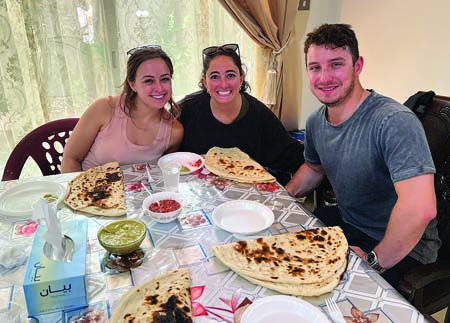Editor’s Note: In 2014, Susan and Mark Sisisky created the Susan and Mark Sisisky Global Jewish Enrichment Fund at Richmond Jewish Foundation. In a highly competitive process, carefully screened young adult Jewish leaders in Richmond are chosen to travel internationally to learn the important work of the American Jewish Joint Distribution Committee around the world. After some planning, Sisisky Fellows then experience an approximate 10-day experience to share their knowledge and experiences with our community by choosing service experiences including educational events, programs and leadership development opportunities. The following is by Jennifer Adams who recently traveled to the United Arab Emirates.
By Jennifer Adams
Growing up in the UAE, an Arab, Muslim majority country that didn’t have diplomatic relations with Israel, Houda had never met a Jewish person before.
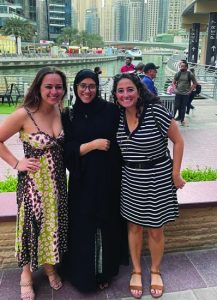 Through her job as a tour guide, she met groups from all across the globe. While she chose to dress in the traditional Muslim abaya and hijab, many of her tour groups wore typical western clothing- jeans, T-shirts, tank tops, etc.
Through her job as a tour guide, she met groups from all across the globe. While she chose to dress in the traditional Muslim abaya and hijab, many of her tour groups wore typical western clothing- jeans, T-shirts, tank tops, etc.
But this group was going to be different, they were all young Jewish professionals. In preparation for the tour group, someone suggested she watch Fiddler on the Roof. So, when she met the group a week later at their hotel, she was shocked to see that they looked like typical Americans. Where were the black hats, full beards, head coverings and modest clothing that she had seen in the movie?
On the other side of this story, a group of 28 young Jewish adults signed up to travel to the UAE with JDC Entwine.
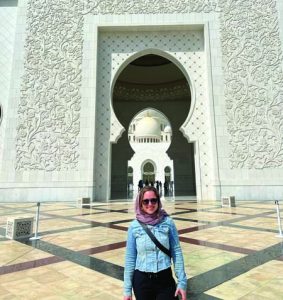 They all knew that they were going to learn about Jewish life there, but no one knew exactly how that was possible in a Muslim country. Were they going to be safe? Could they wear their Star of David necklaces? Or did they have to hide their Jewish identities? Would it be ok to wear shorts and tshirts in the 90 degree desert heat in a Muslim country?
They all knew that they were going to learn about Jewish life there, but no one knew exactly how that was possible in a Muslim country. Were they going to be safe? Could they wear their Star of David necklaces? Or did they have to hide their Jewish identities? Would it be ok to wear shorts and tshirts in the 90 degree desert heat in a Muslim country?
As a member of this cohort, I walked off the plane in my T-shirt and leggings, expecting to feel uncomfortable stares at my western attire. I was surprised to find that most people around me were dressed similarly and those wearing abayas and thawbs were in the minority. When I met Houda at the hotel that night, I realized that under the abaya and hijab, she was just like me.
We were both equally stunned to learn that our preconceptions of each other were misplaced.
Eight days later, I left Dubai with a new friend that has made a life-changing impact.
Two years ago, I was thrilled to be accepted as a Sisisky Fellow and eager to finalize my trip to an Eastern European country. Unfortunately, COVID hit a month later and no one was traveling anywhere anytime soon. When countries started reopening their borders, I was offered the opportunity to travel to the UAE with JDC Entwine on the Inside Jewish United Arab Emirates, the Stephen and Sheila Lieberman Trip.
I was unsure if I would have the same meaningful experience in this wealthy Muslim country as I would in an Eastern European country with an established Jewish community. Did Jews even live in the UAE? Having done limited research, I decided to go for it and it was one of the best decisions that I’ve made in my life.
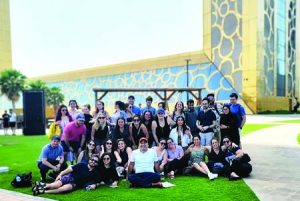 I’ve always had a strong Jewish identity and been a staunch supporter of Israel. After I graduated college, I moved to Tel Aviv to participate in a Masa program. Since then, Israel has felt like my second home.
I’ve always had a strong Jewish identity and been a staunch supporter of Israel. After I graduated college, I moved to Tel Aviv to participate in a Masa program. Since then, Israel has felt like my second home.
When tensions between the Israelis and Palestinians escalated last year and anti-Semitic incidents increased worldwide, I was deeply disappointed. So many of my non-Jewish friends were vocal supporters of other minority groups, but when the hate was directed at Jews, they were silent.
It felt like peace was just a dream and would never become reality. I felt hopeless. And then I arrived in the United Arab Emirates and my whole outlook changed, in the last place I would ever expect.
During our time in Dubai, we visited the Crossroads of Civilization Museum with the museum’s founder, Ahmed Obeid AlMansoori. The museum began as a private collection of global artifacts from the three monotheistic religions.
Then in 2021 the museum expanded to include the first permanent Holocaust exhibit in the Arab world, which opened on Yom Hashoah in April 2021. Ahmed greeted us in the courtyard of the museum, the very same site of the first ever Yom Hashoah ceremony in an Arab state.
Hearing this man, wearing a keffiyeh and thawb, speak about the importance of Holocaust education gave me the chills.
When asked why, from an Arab perspective, did he think the UAE chose to normalize relations with Israel, his answer was simple and profound – ‘prosperity.’
For centuries, Jews and Arabs had coexisted peacefully and prospered but only recently did we turn from brothers to enemies. In order to flourish, we must return to brotherhood.
And Ahmed doesn’t just talk the talk, he walks the walk. He makes it his mission to bring Jews and Arabs together for regular dialogue with the hopes of breaking barriers and building relationships.
The most powerful moment of my trip occurred over Shabbat. As we gathered for Friday night services in the makeshift temple in the home of Rabbi Elie Abadie, the Senior Rabbi of the Jewish Council of the Emirates, I thought to myself “Wow, I’m in an Arab country openly performing a Jewish ritual, how amazing. There isn’t even any security standing at the door.”
In my hometown of Richmond, Virginia, I had never been to a Jewish gathering place where there wasn’t a cop sitting outside. Then, as we began to pray, you could hear the Muslim call to prayer. It was unreal; coexistence was happening right before my very eyes.
And then, when I thought I’d seen it all, two Muslim men wearing thawbs and keffiyehs walked in to join us. My jaw hit the floor. Immediately following services, we peppered the JDC fellow and Jewish community members with questions and we learned that this unusual occurrence wasn’t all that unusual.
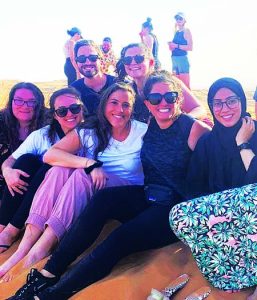 Local Emiratis actually attend services and holiday celebrations quite often. The two men who joined us were preparing for a trip to Israel and were interested in learning more about Jewish culture.
Local Emiratis actually attend services and holiday celebrations quite often. The two men who joined us were preparing for a trip to Israel and were interested in learning more about Jewish culture.
This happens in the reverse too- Jews are regular guests of iftar celebrations after Ramadan. These leaders of the expat Jewish community partner with the Emirati community to promote peace, understanding, and respect between their cultures. This decades-long dream is becoming a reality.
Throughout our trip, both Arab and Jewish community leaders kept referencing the Abraham Accords, which normalized relations between Israel, the UAE and Bahrain in 2020.
I remember hearing about it in the news and thinking that it was a nice gesture but it’s probably just a political statement, nothing would really change. I’m happy to say that I was very, very wrong.
The Abraham Accords changed the public discourse about Israel completely. Before the Abraham Accords, you couldn’t call Israeli phone numbers, Israeli websites like the Jerusalem Post were blocked, references to Israel in the media were always negative – referring to Israel as the “enemy” or “occupier”, and Jews practiced their Judaism underground.
After the Abraham Accords were signed, media coverage of Israel was positive and Jews could come out of hiding. Not just that, but everywhere we visited we encountered more Israelis- you could hear Hebrew being spoken everywhere!
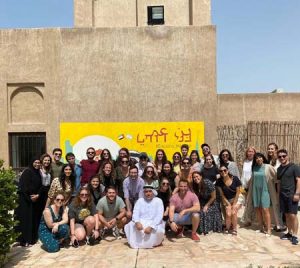 Think about that- a country that borders Saudi Arabia is advertising its relationship with Israel and welcoming Jews.
Think about that- a country that borders Saudi Arabia is advertising its relationship with Israel and welcoming Jews.
A month earlier, I wouldn’t have blinked twice at the mention of the UAE. It was never somewhere I saw myself visiting. If you ask me now, I would say it’s a country that everyone should visit, especially Jews. The more that Jews and Arabs can interact in a positive way, the closer we become to peace between our cultures and communities.
Since I’ve returned to Richmond, Israelis have suffered multiple terrorist attacks. But if you look on social media, you’ll see that the UAE tweeted support for Israel. When I saw that public condemnation of terrorism from the UAE, I was so proud.
These aren’t just words they typed up, they mean them. I also saw that Ahmed, the owner of the Crossroads of Civilization Museum, was chosen to lead the first ever UAE delegation to the March of the Living.
The UAE is truly a beacon of hope for peace in the Middle East and the world. I feel honored that I was able to be an eyewitness to history in the making.

